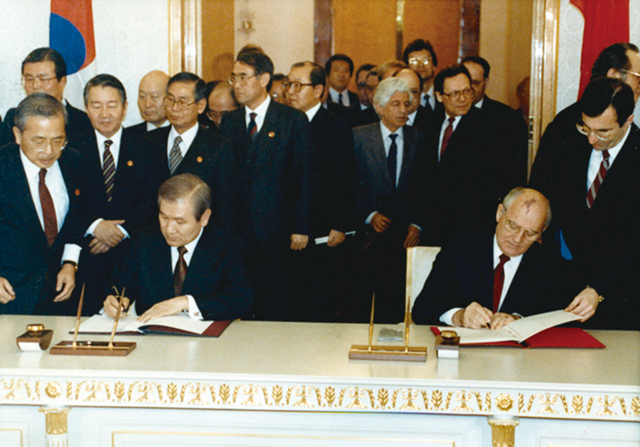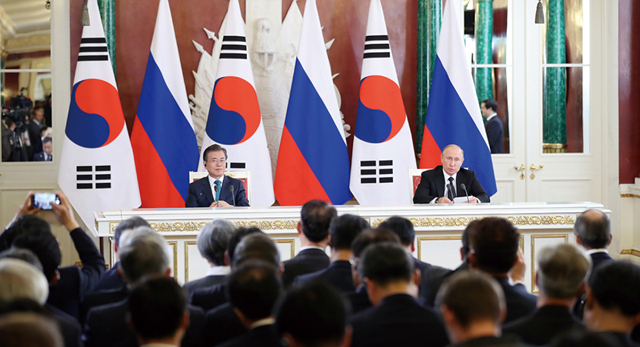NORTHEAST ASIAN HISTORY FOUNDATION 12/2020
-
Choi Duk-kyu, Research Fellow of NAHF Institute on Korea-Japan Historical Issues

Presidents of the Republic of Korea and the Soviet Union sign a joint declaration(1990)
President Roh Tae-woo, who is visiting the Soviet Union officially,
signs a joint declaration with Soviet President Gorbachev
ⓒPresidential Archives
On September 30, 1990, Korea and the Soviet Union established diplomatic relations. The two countries established diplomatic relations for the first time in 1884 by signing ‘The Treaty of Friendship and Commerce between Korea and Russia’. However, official relations between the two countries were suspended by the Eulsa Treaty(1905), which Japan took away South Korea's diplomatic rights. Therefore, diplomatic relations between Korea and the Soviet Union meant restoration of relations for 85 years. Since then, Korea and the Soviet Union have been in hostile relations in the Cold War system. The normalization of the disconnected and confrontational relationship came after the summit between President Roh Tae-u of Korea and Communist Party Secretary Mikhail Gorbachev of the Soviet Union held in San Francisco on June 4, 1990.
Historical Meaning of diplomatic relations between Korea and the Soviet Union
As the Soviet Union was dissolved in 1991 and the Russian Federation was established, the relationship between Korea and the Soviet Union was succeeded by the relationship between Korea and Russia. South Korea and Russia signed a visa exemption agreement in 2014, increasing the number of visitors to both countries to 770,000 in 2019. As a result, South Korea became Russia's 8th-largest trading partner, and Russia became the South Korea's 10th-largest trading partner.
Since Korea and Russia bordered the Tumen River in 1860, the two countries have shared historical experiences. This is similar to the reason that Chinese historical change has had a great influence on the history of Joseon. As the Russian Empire and Japan's imperial expansion policy decided the fate of the Korean Empire, the competition between communism and capitalism resulted in the division of the Korean peninsula.
Thus, just as King Gojong of Joseon emphasized Russia as an alternative to the Chinese world order that was helpless in the invasion of the imperialist powers, the Northern policy of the Roh Tae-woo government, which sought to improve relations with the Soviet Union in preparation for the sudden change of the communist regime that had collapsed along with the dismantling of the Cold War, can be said to have succeeded the northern diplomacy of the Gojong government.
The Origin of diplomatic relations between Korea and the Soviet Union: Northern Diplomacy of the Gojong Government
The study on the northern policy of the Gojong government is significant in that it forms the prototype of today's new northern policy. Modern Korean diplomacy was established through the process of breaking the traditional framework of Chinese order and at the same time converting from Confucian ideology to pragmatic multilateral diplomacy. Theory of Barng-ah based on Theory of Hwa-ih was the guideline of Korean diplomacy that the Qing Dynasty inspired King Gojong of Joseon. Thus, the diplomatic relations between Joseon and Russia(1884), which overcame the consciousness that feared Russia and accepted it as a strategic partner, were a watershed from traditional diplomacy to modern diplomacy and were the starting point of the construction of an independent state.
Until the diplomatic relations between Joseon and Russia, the diplomatic guide of modern Korea was 『Joseon chaennyak』". This book was known in Korea by Kim Hong-jip returned from Japan and made Gojong read a book written by Hwang Jun-sen of Qing Dynasty. He Ru-zhang, Hwang Jun-sen of the Qing Dynasty, advised and recommended Kim Hong-jip who was dispatched to Japan to grasp the war crisis between Russia and the Qing Dynasty, on the foreign policy of Joseon.
The key was to stay close to China, to combine with Japan, to establish ties with the United States to prevent Russia from entering the South and to strengthen Joseon. In other words, “Russia's invasion in East Asia will begin from Joseon, so you must cooperate with the Qing Dynasty, Japan and the United States, which are afraid of Russia's invasion.”
So why did the Gojong government want to establish diplomatic relations with Russia, unlike the contents of 『Joseon chaennyak』? This is connected to 'Who is the person who has such a new idea?' This is because diplomatic relations between Korea and the Soviet Union are in the same context as overcoming the fear of communist countries. Even though the 『Joseon chaennyak』 preached the theory of Barng-ah in preparation for Russian invasion, the person who overcame the consciousness that feared Russia and embraced Russia in the history of modern Korean international relations was King Gojong of Joseon. He attempted to establish a new relationship with Russia because he predicted a new world order to replace the declining China.

President Moon Jae-in and President Vladimir Putin's summit(2018) ⓒCheongwadae
The foundation of diplomatic relations between Joseon and Russia: Overcoming the consciousness of fearing Russia
The diplomatic relations between Korea and the Soviet Union have helped to resolve the fear of the communist Soviet Union. In the same sense, Joseon had to overcome the consciousness of fearing Russia in order to approach Russia. 『Joseon chaennyak』 was only a concern of the Qing Dynasty about the expansion of Russia, and it may be irrelevant to Joseon. Because the decline of the Qing Dynasty weakened the traditional trust of Joseon in Qing. This meant that Joseon could use the agitation of Qing as an opportunity to strengthen independence. Gojong was aware of it. It is difficult to maintain independence by leaning on the Qing, and it is difficult to expect Qing's aid when a third country invades Joseon.
This position of King Gojong is clearly revealed on October 2, 1880, when he heard Kim Hong-jip's report. Gojong made clear his position on the theory of Barng-ah as follows. “This is not for Joseon, but actually for the Qing Dynasty.” 『Joseon chaennyak』 was in fact the survival strategy of the Qing Dynasty.
A Study on the Relationship between Korea and Russia
Russia has had a profound impact on the development of modern and contemporary Korean history. However, the research on the history of the Korea-Russia relationship is in a state of incompleteness due to the following reasons. First, it is the limit of data. The data related to Korea in the Russian National Archive are restricted in access and collection, and old data are difficult to decipher. This issue requires cooperation from the two countries at the relevant institutions. Second, the history of Korea-Russia is not a study with self-completeness but rather a characteristic of being completed through communication with neighboring studies. This is because the history of Korea-Russia relations forms part of the history of imperial international relations and the Cold War History. Therefore, in order to study Korean-Russian relations properly, it is necessary to have a more macroscopic and global approach, not just the relationship between Korea and Russia.
The user can freely use the public work without fee, but it is not permitted to use for commercial purpose, or to change or modify the contents of public work.



